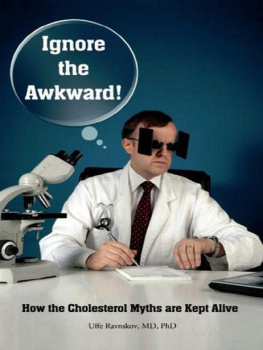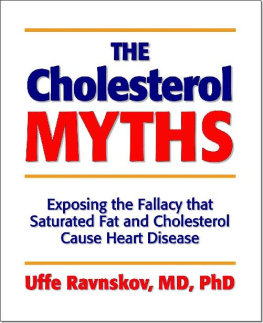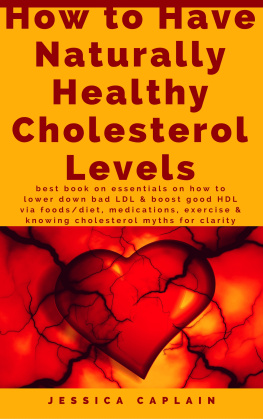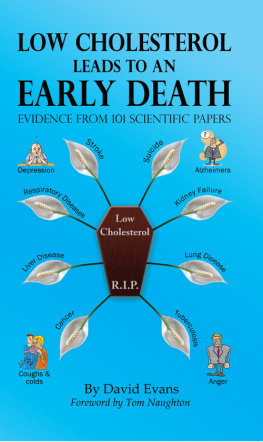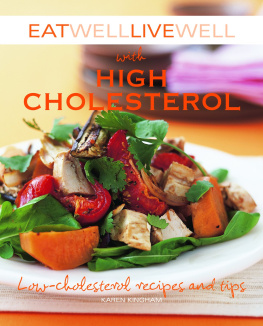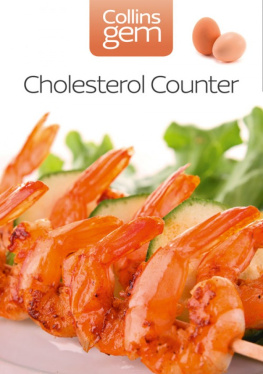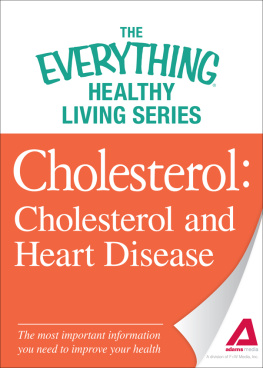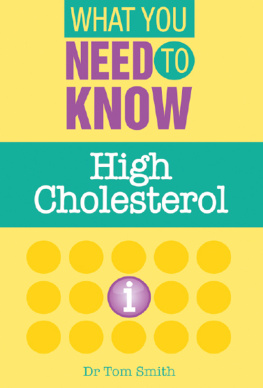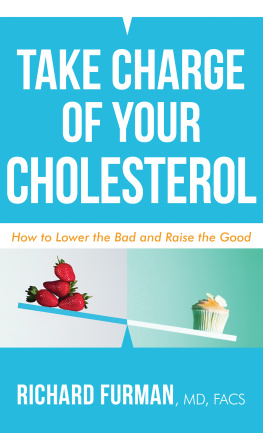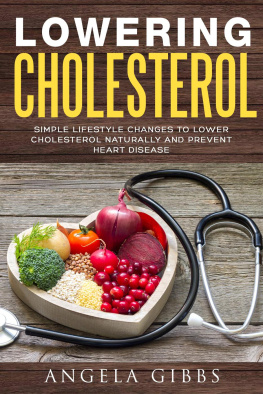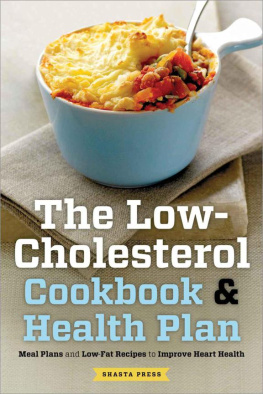

Lets be clear: the work of science has nothing whatever to do with consensus. Consensus is the business of politics. Science, on the contrary, requires only one investigator who happens to be right, which means that he or she has results that are verifiable by reference to the real world. In science consensus is irrelevant. What is relevant is reproducible results. The greatest scientists in history are great precisely because they broke with the consensus. There is no such thing as consensus science. If its consensus, it isnt science. If its science, it isnt consensus. Period.
Michael Crichton
This book is intended solely for informational and educational purposes. Please consult your doctor if you have any questions about your health. Because the proponents of the cholesterol campaign have misled most doctors, it may also be a good idea for him or her to read this book.
ISBN 1453759409
E-Book ISBN: 978-1-61789-046-8
Copyright 2010 Uffe Ravnskov
Cover Photo: Jan Nordn
Contents
Now theyre planning the crime of the century Well what will it be?
Read all about their schemes and adventuring
Yes its well worth a fee
So roll up and see
And they rape the universe
How theyve gone from bad to worse
Who are these men of lust, greed, and glory?
Rip off the masks and lets see.
But thats not right - oh not, whats the story?
Theres you and theres me
That cant be right
Hodgson, Roger, Davies, Rick (Supertramp)
A fad idea
Are you worried about your high cholesterol? Do you avoid butter, cheese and cream because you are afraid of dying from a heart attack? Do you take a cholesterol lowering drug? If so, you are a victim of the cholesterol campaign, the greatest medical scandal in modern times. Even worse, you may suffer from bad memory, muscle weakness, pain in your legs, sexual impotency or cancer, not because you are getting old, but because of the harmful effects from your cholesterol treatment.
Dont you believe me? Neither does your doctor because all the experts have said that cholesterol reduction is harmless.
Unfortunately they are wrong. Not only have the pharmaceutical companies and their paid researchers succeeded in presenting the cholesterol reducing drugs as a gift from heaven. The very idea that saturated fat and high cholesterol are deleterious to health is created out of thin air. In spite of that it has been accepted uncritically across the globe.
The hypothesis that is used as the argument for the cholesterol campaign has three paragraphs. First, the concentration of cholesterol in the blood goes up, if we eat too much saturated fat. Second, when cholesterol is too high, our arteries are converted from smooth canals to rough-walled and narrowed tubes. Thirdly, because of the irregular artery wall a blood clot may be created causing a myocardial infarction or a stroke. Let us take a first, short look at them.
Saturated fat isnt bad
That saturated fat is harmful to human health runs counter to common sense. Fat is composed of various types of fatty acids and fatty acids are molecular chains of various lengths, mainly composed of carbon and hydrogen atoms. Some fatty acids lack hydrogen atoms and therefore they have one or more double bonds between the carbon atoms. They are named monounsaturated with one double bond and polyunsaturated, if they have more than one. Small amounts of mono and polyunsaturated fatty acids are necessary for normal cell function. We produce them ourselves except for a few of the polyunsaturated ones, which we need to get from our food.
Saturated fatty acids are stable molecules because they are saturated with atoms of hydrogen. One of the main constituents of our cell walls is saturated fat. We produce saturated fat ourselves to build new cells and the excess is deposited in our fat cells for later use. Saturated fat is the dominant type of fat in milk, the fluid that is able to nourish the growing baby for a long time after birth, on its own.
Do you really believe that humans are designed to produce a toxic molecule that will eventually kill us? Could the dominant fat in mothers milk be poisonous to the baby? It is simply a masterpiece of deceit to convince a whole world that too much saturated fat in our food should cause a deadly disease.
High cholesterol is good
When I heard about the cholesterol hypothesis for the first time I had just left the University of Copenhagen with an MD. The paper that raised my interest came from Framingham, a small town near Boston, where a research team had studied a large number of its citizens for some years. What they discovered was that the concentration of cholesterol in the blood of those who suffered a heart attack during the observation time had been a little higher when they entered the program. The directors had concluded that high cholesterol was the very cause of myocardial infarction.
My biochemical knowledge was still intact then and I knew that cholesterol was one of the most important molecules in our body. It is impossible to build cell walls and nerve fibres without cholesterol. We produce other important molecules, for instance the sex and stress hormones, by changing the structure of the cholesterol molecule a little. With a little help from the sun our skin cells use the same method to produce vitamin D. Cholesterol is also of vital importance for the brain. We cannot think clearly without it. Not only is cholesterol used by the brain cells and all nerve fibres as an important building material; the chemical processes necessary for the creation of nerve impulses are also dependent on its presence. It is therefore no surprise that the brain has the highest concentration of cholesterol in our body. The importance of cholesterol is apparent from the fact that the richest source of cholesterol in our food is the egg, because much cholesterol is necessary to produce a healthy, living, warmblooded creature. Cholesterol is so important that all cells are able to produce it by themselves. In fact, every day we produce three to five times more cholesterol than we eat. If we eat too little in our diet, the production goes up; if we gorge on animal foods, it goes down. This is why it is so difficult to reduce and control blood cholesterol with diet. When you have read this book you will even realise that high cholesterol is good; the higher the better.
The idea that a little extra cholesterol in the blood should result in a deadly disease seemed to me just as silly as to claim that yellow fingers cause lung cancer, or that burning houses are set on fire by the fire brigade. I didnt pay much attention to the Framingham report, because I thought that such foolish ideas would soon be disproved by more intelligent scientists. Sadly, I was wrong.
Why I have written this book
Many people who have read my previous books have probably realized that I am a truthful person, but some readers may still wish to question me. Doesnt he know that the cholesterol campaign is led by the worlds best experts? Surely, it is Ravnskov who has misunderstood the issue. Hasnt he just cherry-picked the results that are seemingly contradictory? How could it be possible to seduce a whole world of scientists?
Judge for yourself. My aim with this book is to show how white has been turned into black by ignoring any conflicting observations; by twisting and exaggerating trivial findings; by citing studies with opposing results in a way to make them look supportive; and by ignoring or scorning the work of critical scientists.

